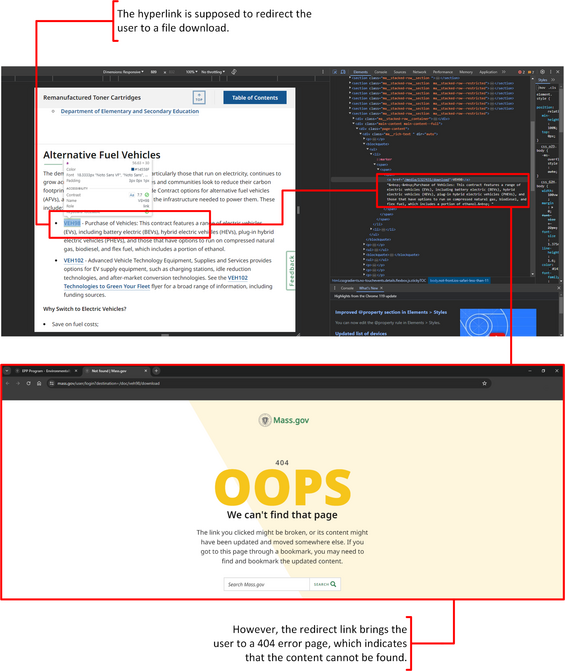Overview
Some of the Operational Services Division’s (OSD’s) Mass.gov webpages do not comply with state information technology (IT) accessibility standards for navigation accessibility and content display. We determined that 11 out of the 35 OSD mass.gov webpages tested contained hyperlinks that did not allow users to navigate to related pages (i.e., broken and faulty hyperlinks). For display testing, we determined that 1 out of the 35 OSD Mass.gov webpages we tested did not display content correctly when zoomed to 400%.
Navigation Accessibility: Broken Hyperlinks
Broken or faulty hyperlinks negatively impact the user experience and make it difficult to locate additional relevant information. (See example below.) They can also limit some users from having equitable access to critical information and key online services offered by OSD. Specifically, these hyperlinks could increase the likelihood that residents will access outdated or incorrect information or will be directed to webpages that no longer exist.
Navigation Accessibility: Content Display
If content does not display correctly (e.g., in a single column) when a user zooms or enlarges the content on a webpage, users may not be able to read the content without additional assistive technology that they may not typically need.

Authoritative Guidance
The IT Accessibility Standards section of the Executive Office of Technology Services and Security’s (EOTSS’s) Enterprise Information Technology Accessibility Policy states,
1. a. Accessibility of electronic content, applications, or services must be measured with one or more of the applicable following technical standards.
i. Web and desktop applications, multimedia content, electronic documents: Web Content Accessibility Guidelines 2.1 (WCAG), level A and AA Guidelines.
The Web Accessibility Initiative’s Web Content Accessibility Guidelines (WCAG) 2.1 states,
Success Criterion 1.4.10 Reflow
(Level AA)
Content can be presented without loss of information or functionality, and without requiring scrolling in two dimensions [i.e., in more than one column] for:
- Vertical scrolling content at a width equivalent to 320 [cascading style sheet (CSS)] pixels;
- Horizontal scrolling content at a height equivalent to 256 CSS pixels.
Except for parts of the content which require two-dimensional layout for usage or meaning. . . .
Note: 320 CSS pixels is equivalent to a starting viewport width of 1280 CSS pixels wide at 400% zoom. For web content which is designed to scroll horizontally (e.g. with vertical text), the 256 CSS pixels is equivalent to a starting viewport height of 1024 [pixels] at 400% zoom. . . .
Success Criterion 2.4.5 Multiple Ways
(Level AA)
More than one way is available to locate a Web page within a set of Web pages except where the Web Page is the result of, or a step in, a process.
Reasons for Issue
OSD told us that the hyperlinks were broken or faulty because certain webpages became defunct and others changed domains. The content display issue occurred because OSD chose a webpage template that did not display enlarged text in one column.
Recommendations
- OSD should review its Mass.gov webpages to ensure that all hyperlinks lead to related information to provide equitable access to critical information and services offered online by OSD for all Massachusetts residents and state agencies.
- OSD should ensure that content on its Mass.gov webpages displays clearly, even when zoomed up to 400%, resulting in a user experience that is inclusive of all Massachusetts residents and state agencies.
Auditee’s Response
OSD maintains 473 pages on the mass.gov website. Those pages include numerous hyperlinks. OSD’s web team monitors the broken links report regularly and fixes identified links immediately. As part of a recent redesign of OSD’s mass.gov webpages, OSD recently conducted a comprehensive review of all OSD pages and fixed the broken links identified in that review. . . .
EOTSS controls the appearance of webpages on Mass.gov. Individual agencies are provided with limited options for customization of their pages. It would be helpful if [the Office of the State Auditor] would identify the particular page so this issue should be brought to the attention of EOTSS so that EOTSS may review their templates and identify and correct any issues. Since the audit team identified only one page that failed the content display testing, OSD is hopeful that this issue is limited to a small number of available templates and can be easily corrected by EOTSS.
Auditor’s Reply
Section 2 of Chapter 7D of the Massachusetts General Laws requires all executive branch agencies, including OSD, to “adhere to the policies, procedures, and objectives established by the executive office of technology services and security.” We acknowledge that EOTSS (as the oversight agency) plays a role in ensuring the accessibility of web content for executive branch agencies; however, the responsibility rests with OSD to ensure that IT solutions and web content are in compliance with EOTSS’s Enterprise Information Technology Accessibility Policy. We provided the information on the testing exceptions we identified to OSD (specifically, the Environmentally Preferable Products Index webpage). Although EOTSS provides templates to agencies, it is OSD’s responsibility to ensure that the content it displays using these templates is accessible.
Based on its response, OSD is taking measures to address our concerns on this matter.
| Date published: | April 25, 2024 |
|---|